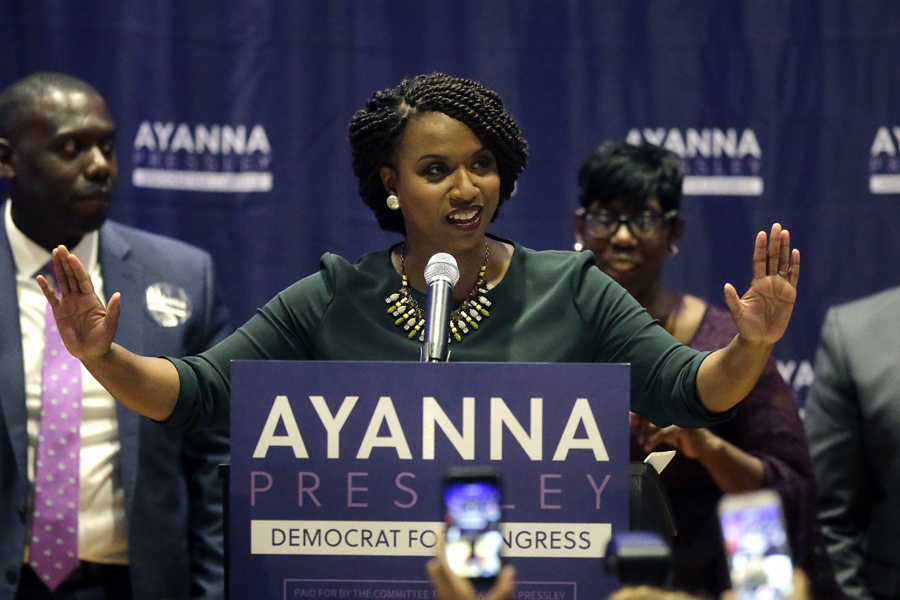Ayanna Pressley Will Become the First Black Woman to Represent Massachusetts in Congress
She beat Mike Capuano in a daring Democratic primary battle.

Boston City Councilor Ayanna Pressley celebrates victory over U.S. Rep. Michael Capuano, D-Mass., in the 7th Congressional House Democratic primary, Tuesday, Sept. 4, 2018, in Boston. (AP Photo/Steven Senne)
She really did it.
In a surprise win that will unseat long-term incumbent Congressman Mike Capuano, Boston City Councilor Ayanna Pressley has pulled off a daring Democratic primary challenge and won. She will become the first black woman to represent Massachusetts in Congress.
“It seems like change is on the way,” Pressley told supporters gathered in Dorchester, in a speech that paid tribute to Capuano’s legacy but also celebrated an historic victory. “These times demanded more from our leaders and from our party. These times demanded an approach to governing that was bold uncompromising and unafraid. That with our lives under assault with our freedoms under siege that it’s not just good enough to see the Democrats back in power, but it matters who those Democrats are.”
Pressley will keep Capuano from serving another term representing the state’s 7th District, which encompasses half of Boston, as well as Cambridge and Somerville. He had not faced a challenger since 2012. The victor in the Democratic primary will not face a Republican in the general election.
“For the last 8 months, most of you have been working hard for us, and I will tell you I’m sorry it didn’t work out but this is life, and this is OK,” Capuano said, addressing his supporters. “America is going to be OK. Ayanna Pressley is going to be a good Congresswoman and Massachusetts will be well served.”
At a moment that has seen establishment figures given serious challenges, or even toppled, the race had been closely watched far beyond Massachusetts as a test case for the prospects of younger, outspoken members of the party aiming to shake things up in the Trump era. It was in many ways a referendum on who Boston is.
Political observers struggled to find policy differences distinguishing Capuano and Pressley, both of whom identify as progressives and largely support the same causes. They did however differ in style, as well as in their backgrounds. Pressley, who became the first black woman elected to Boston’s City Council in 2009, had argued she would better represent the state’s most diverse district and that she would bring a fresh perspective to the issues.
Capuano, whose heritage is Irish and Italian, highlighted a career fighting for progressive causes, even when it put him at odds with members of his own party. He championed “Medicare for All” long before the concept picked up steam among Democrats, has long been an advocate for gay rights, and made Somerville a “sanctuary city” way back in the 1980s. In the weeks leading up to the primary, his campaign ran ads on TV urger voters to “keep Mike in the fight.”
There were some areas where the two candidates disagreed. Pressley, for one, had joined left-wing activists in calling to abolish Immigration and Customs Enforcement, the scandal-ridden federal agency whose duties include rounding up and deporting undocumented immigrants, while Capuano had stressed the need to reform immigration policy instead.
Pressley had faced a pretty steep climb. The most recent polling showed Capuano with a 13-point lead. Still, in an off-year, turnout remained an open question, and it wasn’t clear what voters fired up by a polarizing year of politics might do at the ballot box.
Younger voters appeared energized by Pressley’s campaign, as were activists eager to shake up an all-white delegation, and her run for Congress picked up a number of key endorsements: in the editorial pages of the Boston Globe and Boston Herald, from Attorney General Maura Healey, and from the grassroots group Progressive Massachusetts. Capuano came to the challenge with supporters who’d been by his side for decades, and some friends in high places, including Boston Mayor Marty Walsh and former Gov. Deval Patrick, and he had even earned a nod from the Congressional Black Caucus PAC.
National attention had been drawn to the race, as think-pieces about the implications of its outcome piled up this summer. Helping stoke that discussion was an endorsement for Pressley from New York’s Alexandria Ocasio-Cortez, the self-identified Democratic Socialist whose unexpected primary win over an incumbent thrust her into the national spotlight. “Vote her in next,” Ocasio-Cortez had said of Pressley.
And that’s what they did.
The moment when @AyannaPressley learned she won. No commentary needed.
#ChangeCantWait #mapoli #ma7 #electwomen #electionday pic.twitter.com/SLLlQTI1Sj
— Jesse Mermell (@jessemermell) September 5, 2018
Congratulations to my sister in service, @AyannaPressley, on continuing her historic path into Congress tonight.
Let’s push together to make Medicare for All, tuition free college, & living wages a reality in America – all without corporate PAC money.
https://t.co/o2SbtUkByS
— Alexandria Ocasio-Cortez (@Ocasio2018) September 5, 2018


